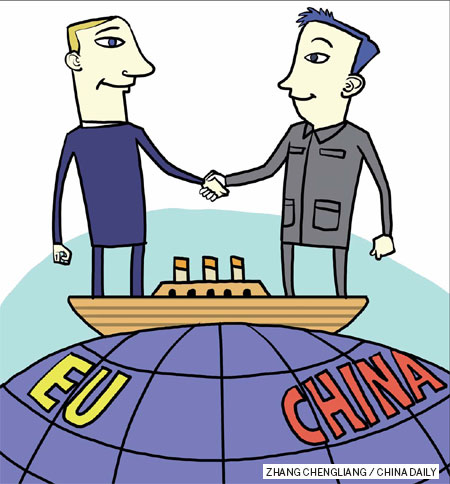
Two China-themed public events were organized in Brussels this month.
Even though the Belgian capital is still on high security alert after the terrorist attacks in Paris last November, which had links with the city, a Spring Festival parade took place on the eve of China's most important traditional celebration.
Brussels had cancelled its 2016 New Year fireworks celebrations, but Chinese, Belgians and diplomats from other countries, joined together to watch dragon and lion dances, fashion shows, music performances, martial arts and Peking Opera. Even the iconic Manneken Pis, a small bronze statue in central Brussels, was draped in traditional Chinese clothes.
The parade, in the streets of the oldest part of Brussels, sent out a message of joy and love, demonstrating that Brussels is still safe and its residents are still able to enjoy public festivities.
A growing number of Europeans have come to enjoy Spring Festival celebrations, just as Christmas is celebrated by some Chinese people.
But in contrast, nearly 10 days later about 5,000 steelworkers marched on the streets outside some of the European Union institutions in Brussels, barely a 20-minute walk from where the Spring Festival parade took place.
The demonstration was peaceful, but it was the first on such a large scale targeting China; a reminder that although the Sino-EU relationship has been boosted to a new high, Brussels had previously taken it to a low point in a few years ago with its anti-dumping probe of China's solar panel exports.
The protesters shouted two slogans: Do not give China market economy status and stop dumping cheap steel products.
Most of the steelworkers I talked with, had never visited China, knew nothing about China's economic restructuring efforts and had no knowledge of the connection between market economy status, dumping and their daily bread.
They didn't even know of China's low-cost exports which have helped equip them for their work and enabled them to enjoy their everyday lives comfortably.
Yet they happily followed the urging of their union leaders to appear on the streets, chanting misleading slogans that will once again damage China's image as a result of all the media coverage the demonstration received.
The real figures are telling.
The volume of trade disputes between China and the EU has amounted to less than 2 percent of total bilateral trade. None of the 80 countries which have granted China market economy status say they have lost out while China wins. And no other major steelmaking economy, such as the United States, Canada or Japan, has organized this kind of protest.
Apart from the steelworkers' protests against China, Brussels has also taken other measures in a bid to win more bargaining chips when dealing with Beijing. It started a 10-week public consultation exercise on whether the EU should grant China market economy status, and has employed an expert panel to submit its assessment before the European Commission makes a decision in July. The European Parliament will vote on this before the deadline.
All in all, Brussels is using these as a kind of delaying exercise. They show, once again, the need for greater efficiency in the EU bureaucracy to boost confidence amid its many crises, including terrorism, refugees, economic recession, the integration process and other geopolitical concerns.
The essence of Chinese culture is that its people are willing to replace evil with good when handling disputes and they hope that their goodwill will pay off in a mutually beneficial way. It is to be hoped the politicians and lobbyists in Brussels can demonstrate such wisdom.
The author is deputy editor of China Daily European Edition. fujing@chinadaily.com.cn

I’ve lived in China for quite a considerable time including my graduate school years, travelled and worked in a few cities and still choose my destination taking into consideration the density of smog or PM2.5 particulate matter in the region.